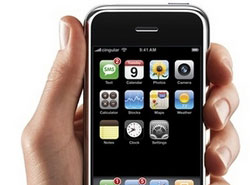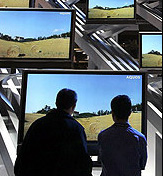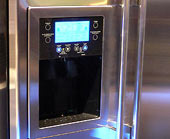|
|
|
Apple First-Quarter Profit Rises on IPod
World Business News |
2007/01/17 16:21
|
| Apple Inc. said first-quarter profit jumped 78 percent after holiday shoppers snapped up iPod digital music players and Macintosh computers. Net income rose to $1 billion, or $1.14 a share, from $565 million, or 65 cents, a year earlier, Cupertino, California-based Apple said today in a statement. Sales rose 24 percent to $7.12 billion. Analysts anticipated profit of 78 cents, according to the average of 14 estimates compiled by Bloomberg. Apple sold a record 21.1 million iPods after Chief Executive Officer Steve Jobs stoked holiday demand by releasing smaller, less-expensive and higher-capacity models. Updated Macs with faster chips from Intel Corp. helped drive shipments to 1.61 million machines. Sales gained in the U.S. and abroad. ``The results today confirm that Apple's product portfolio is a superior offering to the market place,'' said Glen Kacher, a fund manager at Integral Capital Partners in Menlo Park, California, which owns Apple shares. This year ``should be a victory lap for Apple.'' Profit and sales this quarter will fall short of analysts' estimates. Apple forecast earnings of 54 cents to 56 cents a share, compared with the 60-cent average analyst estimate. The company expects sales of $4.8 billion to $4.9 billion, below analysts' average estimate of $5.23 billion. |
|
|
|
|
|
|
Apple hopes to make history with iPhone
World Business News |
2007/01/14 13:21
|

"We’re going to make some history here today," said Steve Jobs this week at the beginning of his annual speech at Macworld, his company’s cult-like trade show in San Francisco.
He was as good as his word. First, he launched a product that promises at last to bring digital entertainment from people’s computers to their television screens without fuss. Then he unveiled an even more impressive device that transcends the description "mobile phone." Jobs made it clear that he considered this day a watershed in the three-decade history of Apple Computer, a point that he emphasized by announcing that his firm would henceforth drop "Computer" from its name. Indeed, Apple’s laptop and desktop computers were hardly mentioned. Nor were Apple’s iPods, which dominate the market for portable music players. Both of the new products are really computers, but people won’t think of them as such, since they will be in their pockets and living rooms. The mobile phone — provided Apple can settle a legal dispute over the name with Cisco, a network-equipment company — is called the iPhone. It will go on sale in the U.S. in June starting at US$499, in Europe in the autumn and in Asia next year. The television set add-on is called Apple TV and will hit stores next month at $299. With these two products, Jobs intends to enter and transform new industries, and ultimately people’s lives — just as he did in 1984 when Apple transformed computing with the launch of the Macintosh, and again in 2001 when it introduced the iPod, which shook up the music industry. That Jobs’ announcements had such an impact during this particular week says a lot, because the rest of the consumer- electronics, computer and telecoms industries were simultaneously congregating at the Consumer Electronics Show, the world’s biggest technology fair, in Las Vegas. There, many of Jobs’ old and new rivals were talking about much the same things as he was. Microsoft’s Bill Gates introduced the Windows Home Server, his answer for uniting computers and TV sets. Olli- Pekka Kallasvuo, boss of Nokia, a mobile-phone giant, unveiled new handsets that can hold music and videos. But all the gadgets being peddled in Las Vegas were "evolutionary," whereas Apple’s were "revolutionary" and thus noteworthy, says Tim Bajarin, the boss of Creative Strategies, a technology consultancy in California’s Silicon Valley. |
|
|
|
|
|
|
Clifford Chance advises on Gems TV's IPO
World Business News |
2007/01/10 08:38
|
International law firm Clifford Chance has recently advised Gems TV Holdings (Gems TV) on its recent S$354.92 million initial public offering on the Singapore Stock Exchange, the fourth largest IPO in Singapore in 2006. Shares were offered to qualified institutional buyers (QIBs) in the US in reliance on Rule 144A of the Securities Act and to non-US persons under Regulation S.
The IPO was underwritten by Credit Suisse and DBS Bank.
Gems TV is currently the leading dedicated home shopping retailer of gemstone jewellery in the UK and is expanding to new markets in the US, Japan, the PRC and Germany.
The company sells its own handcrafted gemstone jewellery directly to customers via television as well as the internet through a unique "reverse auction" system. The company operates jewellery manufacturing facilities in Thailand, one of the world's leading centres for processing gemstones.
Joan Janssen, the Singapore-based partner who led the Clifford Chance team advising on the deal, commented:
"We were delighted to have advised Gems TV on its IPO in Singapore. Despite the lack of direct comparables and external shocks, such as the coup in Thailand, the company made an impressive debut on the Singapore Stock Exchange and we were happy to have been involved in this very successful IPO."
The Clifford Chance team in Singapore consisted of partners Joan Janssen and Crawford Brickley, senior associate Johannes Juette and associate Ong Hui Ting. They were assisted by partner Andrew Matthews and counsel Angela Nobthai from Clifford Chance's Bangkok office. |
|
|
|
|
|
|
Samsung, LG Seek to Steal Las Vegas Limelight
World Business News |
2007/01/07 11:43
|
The world’s biggest electronics expo opens Sunday (local time), with some 2,700 exhibitors and 140,000 visitors gathering at the Las Vegas Convention Center.
Microsoft Chairman Bill Gates is scheduled to give an opening speech on its 40th edition. Beside the new Windows Vista operating system for PCs, Gates is promoting the Zune digital music player and a new version of Xbox 360 gaming console. The new Xbox 360 will perform as an IPTV set-top box, which will enable users to download movies and TV shows through Internet network and watch them on TV. HP will also debut TVs that can access movies, photos and music directly from computers or from the Internet. "It’s the new CE - not consumer electronics," Jan-Luc Blakborn, HP’s director of digital entertainment, was quoted by AP. "We like to think of it as connected entertainment." From the mobile industry, Sony Ericsson is unveiling a watch that can receive calls, check e-mails and play music. Nokia is taking a mobile tablet PC a phone that can be used as a credit card. Korea’s top two electronics firms _ Samsung Electronics and LG Electronics _ are among key players in this year’s Consumer Electronics Show (CES), each occupying more than 2,000 square meters of space in central spots. Smaller firms such as LG.Philips LCD, Daewoo Electronics, Reigncom and Cowon also are taking part in the industry fest, which goes through this Thursday. Believing that the transition from the high-definition to the full high-definition will be the main theme of the New Year, makers are bringing a wide range of "extreme quality" TVs and video players to the show. But LG is stealing the limelight with the first Blu-ray/HD-DVD dual player. The industry has been divided into two sides _ Blu-ray team led by Sony and Samsung and HD-DVD group inspired by Toshiba and Microsoft. But LG is trying to break the wall and make the competition meaningless with the introduction of this all-around player, though it will carry a somewhat cumbersome price tag. The breakthrough invention will be challenged by Warner Bros., which made a similar attempt from a different angle. The media giant is introducing the Total HD Disc that places both formats of movies on a single disk. The price, however, also remains as a key question mark. Samsung’s showroom will be full of tech-savvy gadgets, and its main focus is large-screen TVs. The company was crowned as the world’s largest TV maker last year with the splendid success of Bordeaux brand, and is unveiling its sequel today. Its 102-inch full-HD TV will certainly be one of the main attractions of the show as well. Committed to the Blu-ray side, Samsung is unveiling new, and cheaper Blu-ray player, which is expected to be priced at around $500. Another noteworthy products are a double-sided LCD display for mobile phones, a slim MP3 music player that has an external speaker, and a slide-up style mobile phone with a full qwerty keyboard. Daewoo Electronics, the distant third after Samsung and LG, is taking a lineup of full-HD LCD TVs with a snowflake pattern embroiled on the frame. Sleek Blu-ray players and car |
|
|
|
|
|
|
Industry denies huge domain name loss
World Business News |
2007/01/06 12:59
|
China's domain name managers and Internet service providers refuted on Friday recent media reports about the loss of domestic domain names following the Taiwan earthquake that severed undersea cables last month. The quake, which measured 7.2 on the Richter scale, off the southern tip of Taiwan on December 26 damaged fiber-optic cables that cross the ocean floor south of Taiwan, affecting telecommunications traffic between the mainland and Taiwan, Hong Kong, the United States, Southeast Asia and Europe. Media reports said since the quake, the domain names of thousands of individuals and companies have become invalid or been looted because of access problems to domain name servers located abroad. The lack of access means the individuals and companies were unable to keep up with the domain leasing fees. Chinese Internet users lost about 10,000 dotcom (.com) domain names due to disruption caused by the quake, the Beijing News reported on Friday, quoting sources from the China Internet Network Information Center (CNNIC), the country's authorized domain name registration manager and administrator. But the CNNIC denied it made the remarks when contacted by China Daily on Friday. Liu Ningbo from HiChina Web Solutions Ltd (www.net.cn), China's largest domain registration service provider, said the losses are only possible in "theory" but not in "reality". Internet users are reminded at least a month before their leased domain expires and the domain names are frozen and kept for one or two months after the expiry date, he said. Liu said the company suspended its registration service for international domains for two days after the quake, but by December 28 it had resumed.
|
|
|
|
|
|
|
Lou Victor on Apple Computer Inc and Steve Jobs
World Business News |
2006/12/29 11:55
|
The headline business news of this morning is the Steve Jobs Apple Computer (NASDAQ: AAPL) stock options situation. The Financial Times reported that a full board meeting at Apple Computer to authorize the issuance of over 7.5 million stock options to Apple CEO Steve Jobs back in 2001 was falsified. So they are reporting that the meeting that was documented as taking place never did and even though Steve Jobs did surrender those stock options and did not receive any direct benefit from those options he is still in the line of fire.
Lets talk about Steve Jobs for a moment, he is the person that brought Apple Computer from the brink of extinction and made it what it is today, a mammoth of a company. He orchestrated the deal with Disney (NYSE: DIS) to put him the position of being the largest shareholder at Disney all the while building Apple as the hands down leader in the portable MP3 market. Through his efforts Apple Computer went from a $10 stock in 2001 to a stock that is on its way to triple digits, investors in Apple have done very well and continue to do so. The concern on the Street is that Steve Jobs is Apple Computer, he is the primary component in Apple’s success and there is no doubt about that. If this situation forces him to step down it will indeed have a very large negative impact on this company. Now is this going to come to that, its doubtful, because the issuance of stock options at that moment in time was probably boiler plate, of course a board meeting should taken place and not have been falsified but how many companies both private and public have done just that and not been crucified for it?, not yet anyway. Steve Jobs is the envy of many CEO’s worldwide, he did in his tenure what most investors would want a CEO in a company that they invested in to do. I’ve always said that he is the poster child for CEO’s and will continue to be for some time to come. It is unclear as to whether Jobs was aware that a board meeting at Apple Computer was falsified but lets look at some facts, this was back in 2001 and those options were given back to the company already. The company is healthier than it’s ever been and investors are in Apple Heaven. The SEC may launch a formal probe and Jobs has already secured an outside attorney to represent him just in case. In my opinion the SEC should have more important things on their mind, one being Sarbanes-Oxley, and not crucifying Jobs for a situation that he may or may not have known about, but think about it why would he risk his future for something so ridiculous as those options would have been granted to him anyway.
This is the media on the prowl for a story but at the end of the day it’s my opinion that Steve Jobs will walk away without a mark. It’s year end and perhaps some profit taking will aid in Apple being knocked down a bit but when the dust settles institutions, fund managers, brokerage firms and investors will come to realize that Apple Computer is still growing and once Jobs is cleared they will be more at ease. |
|
|
|
|
|
|
Samsung: What's for Dinner? Ask the Fridge
World Business News |
2006/12/28 19:31
|
| Samsung Electronics, is now developing a futuristic refrigerator equipped with radio frequency identification (RFID) technology. Samsung on Wednesday said the refrigerators will inform owners when supplies of products are running low. "We are working on refrigerators wired for RFID. Technologically speaking, there is no barrier to come up with the new items," Samsung spokesman Chae Hee-kook said. "The refrigerator will be able to connect to cell phones for various new-concept applications," Chae said. The RFID refrigerator will automatically sense inventory needs such as when milk or juices run low and will then notify its owner. In addition to the early-warning inventory system, the sophisticated home appliance will offer recipes using available food products. Via cell phones, shoppers will be able to check what groceries in their refrigerators are over their expiry date and what needs to be replenished. "Eventually the RFID refrigerator, when programmed, will be able to take charge of replenishment and re-order after checking for depleted groceries," Chae said. "Shoppers will go to the store to see new grocery orders already packed on their arrival. Or, the items will be delivered to their homes thanks to the smart appliance," Chae said. Despite its prospects, it is uncertain when Samsung will unveil the refrigerator since the appliance will be of use only when perishable items adopt RFID tags. "Some foretell 2008 or 2009 as the debut year of our RFID fridges. But we can’t say for sure because nobody knows when RFID tags will become widespread," Chae said. The RFID tag is a small integrated-circuit chip with a radio and identification code embedded into it, which can be scanned from a distance. The tiny tags that emit radio waves are likely to replace barcodes. More precisely, they would go far beyond barcodes thanks to its unique ability to contain information. A host of retailers are presently testing smart shelves incorporated with RFID technologies that track in-store inventory based on real-time purchases. This allows them to anticipate demand and replenish stock earlier than ever. The techniques also enable distributors to trace products in real time irrespective of their locations. In the future, the cutting-edge technology may be used in the fields of livestock tracking, highway toll collection and premium product manufacturing. |
|
|
|
|
|
|
Class action or a representative action is a form of lawsuit in which a large group of people collectively bring a claim to court and/or in which a class of defendants is being sued. This form of collective lawsuit originated in the United States and is still predominantly a U.S. phenomenon, at least the U.S. variant of it. In the United States federal courts, class actions are governed by Federal Rules of Civil Procedure Rule. Since 1938, many states have adopted rules similar to the FRCP. However, some states like California have civil procedure systems which deviate significantly from the federal rules; the California Codes provide for four separate types of class actions. As a result, there are two separate treatises devoted solely to the complex topic of California class actions. Some states, such as Virginia, do not provide for any class actions, while others, such as New York, limit the types of claims that may be brought as class actions. They can construct your law firm a brand new website and help you redesign your existing law firm site to secure your place in the internet. |
Law Firm Directory
|
|







